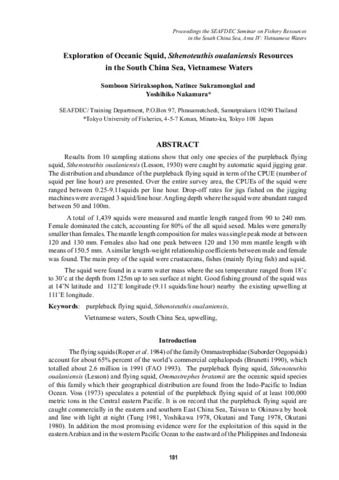Ipakita ang simpleng tala ng item
Exploration of oceanic squid, Sthenoteuthis oualaniensis resources in the South China Sea, Vietnamese waters
Share
| dc.contributor.author | Siriraksophon, Somboon | |
| dc.contributor.author | Sukramongkol, Natinee | |
| dc.contributor.author | Nakamura, Yoshihiko | |
| dc.date.accessioned | 2019-01-18T08:25:02Z | |
| dc.date.available | 2019-01-18T08:25:02Z | |
| dc.date.issued | 2001 | |
| dc.identifier.citation | Siriraksophon, S., Sukramongkol, N., & Nakamura, Y. (2001). Exploration of oceanic squid, Sthenoteuthis oualaniensis resources in the South China Sea, Vietnamese waters. In Proceedings of the Fourth Technical Seminar on Marine Fishery Resources Survey in the South China Sea, Area IV: Vietnamese Waters, 18-20 September 2000 (pp. 181-197). Bangkok, Thailand: Secretariat, Southeast Asian Fisheries Development Center. | en |
| dc.identifier.isbn | 9747604833 | |
| dc.identifier.uri | http://hdl.handle.net/20.500.12066/4374 | |
| dc.description.abstract | Results from 10 sampling stations show that only one species of the purpleback flying squid, Sthenoteuthis oualaniensis (Lesson, 1930) were caught by automatic squid jigging gear. The distribution and abundance of the purpleback flying squid in term of the CPUE (number of squid per line hour) are presented. Over the entire survey area, the CPUEs of the squid were ranged between 0.25-9.11squids per line hour. Drop-off rates for jigs fished on the jigging machines were averaged 3 squid/line hour. Angling depth where the squid were abundant ranged between 50 and 100m. A total of 1,439 squids were measured and mantle length ranged from 90 to 240 mm. Female dominated the catch, accounting for 80% of the all squid sexed. Males were generally smaller than females. The mantle length composition for males was single peak mode at between 120 and 130 mm. Females also had one peak between 120 and 130 mm mantle length with means of 150.5 mm. A similar length-weight relationship coefficients between male and female was found. The main prey of the squid were crustaceans, fishes (mainly flying fish) and squid. The squid were found in a warm water mass where the sea temperature ranged from 18°c to 30°c at the depth from 125m up to sea surface at night. Good fishing ground of the squid was at 14°N latitude and 112°E longitude (9.11 squids/line hour) nearby the existing upwelling at 111°E longitude. | en |
| dc.language.iso | en | en |
| dc.publisher | Secretariat, Southeast Asian Fisheries Development Center | en |
| dc.subject | Sthenoteuthis oualaniensis | |
| dc.subject | Ommastrephidae | |
| dc.subject | Cephalopoda | |
| dc.subject | Viet Nam | en |
| dc.subject | South China Sea | en |
| dc.title | Exploration of oceanic squid, Sthenoteuthis oualaniensis resources in the South China Sea, Vietnamese waters | en |
| dc.type | Conference paper | en |
| dc.citation.spage | 181 | |
| dc.citation.epage | 197 | |
| dc.subject.asfa | length-weight relationships | en |
| dc.subject.asfa | marine fisheries | en |
| dc.subject.asfa | feeding | en |
| dc.subject.asfa | geographical distribution | en |
| dc.subject.asfa | potential resources | en |
| dc.subject.asfa | sex ratio | en |
| dc.subject.asfa | salinity profiles | en |
| dc.subject.asfa | marine molluscs | en |
| dc.subject.asfa | Catch-effort | en |
| dc.subject.asfa | Temperature profiles | en |
| dc.citation.conferenceTitle | Proceedings of the Fourth Technical Seminar on Marine Fishery Resources Survey in the South China Sea, Area IV: Vietnamese Waters, 18-20 September 2000 | en |

